Add 'aisclist@aisc.ucla.edu' to your address book to prevent emails from going to your junk folder.

Message from the Director
Dear AISC friends and family,
We are off and running in the Fall quarter! Please see below for our many exciting activities in the coming month, including our Indigenous Peoples Day event, October 9. Looking forward to seeing you soon.
Warmly,
Shannon Speed
Director, UCLA American Indian Studies Center
Congressional candidate Deb Haaland visited UCLA
|
UCLA Ethnic & Indigenous Studies Fall 2018 Welcome
Monday, October 1, 2018
4–6 PM
James West Alumni Center
325 Westwood Plaza
Los Angeles, CA 90095
African American Studies, American Indian Studies, Asian American Studies, and Chicana/o Studies host the 2nd Ethnic and Indigenous Studies Welcome, open to all students, alumni and Bruin affiliates.
Explore Ethnic and Indigenous Studies at UCLA. Please join us for FREE food, music, and giveaways with fellow students, faculty, and staff. Learn how Ethnic and Indigenous Studies fits into your UCLA experience and beyond. Welcome new Bruins!
RSVP at https://www.eventbrite.com/e/ucla-ethnic-indigenous-studies-fall-2018-welcome-tickets-48974340571
We are #EthnicStudies.
#WeAreUCLA
Kuruvungna Springs Clean Up
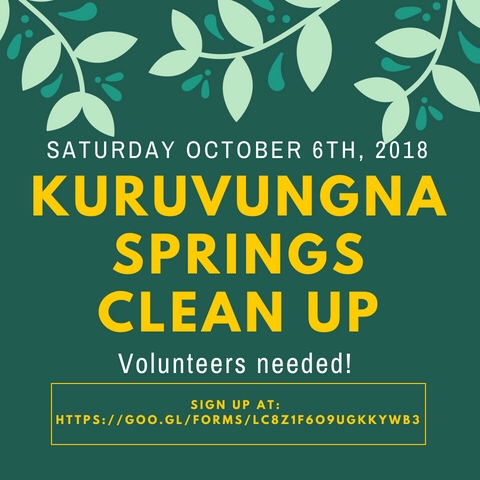 Saturday, October 6, 2018
Saturday, October 6, 2018
9 AM–2:00 PM
1439 S. Barrington Ave, Los Angeles, CA 90025
Contact us at 310-825-6541
Please join us at Kuruvungna Springs to help clean up the area around the springs in preparation for their annual "Life Before Columbus" event. Lunch will be provided to volunteers.
To sign up please visit:Â Â https://goo.gl/forms/lC8z1F6o9UgkKyWB3Â
For more information about the springs please visit:Â Â http://gabrielinosprings.com/wpsite/Â
Indigenous Peoples Day Celebration
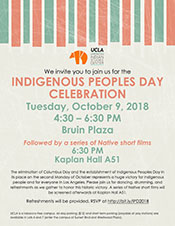 Tuesday, October 9, 2018
Tuesday, October 9, 2018
4:30–6:30 PM
Bruin Plaza
Followed by a series of Native short films
6:30 PM, Kaplan A51 (formerly known as Humanities building)
The elimination of Columbus Day and the establishment of Indigenous Peoples Day in its place on the second Monday of October represents a huge victory for indigenous people and for everyone in Los Angeles. Please join us for dancing, drumming, and refreshments as we gather to honor this historic victory.
RSVP at http://bit.ly/IPD2018
American Society for Ethnohistory Annual Conference 2018
Thursday, October 11–Saturday, October 13, 2018
Hotel Victoria, Oaxaca, Mexico
The Centro Cultural de San Pablo and the Universidad Nacional Autónoma de México are hosting the meeting, and the UCLA Latin American Institute and the UCLA American Indian Studies Center are organizing the program.
The meeting will take place at the Hotel Victoria in Oaxaca City. The hotel is comfortable and inexpensive; there is an excellent hotel package for conference attendees.
Call for Papers 2018
Convocatoria 2018
Click Here for Hotel Reservation (Please note: price will be displayed as pesos)
For more information about the conference, visit http://ethnohistory.org/index.php/annual-conference-2018/
IAC Fall Forum
The UCLA Institute of American Cultures (IAC) Annual Fall Forum 2018 features the 2018–19 IAC visiting researchers and scholars, graduate and predoctoral fellows, and research grant awardees at UCLA’s four ethnic studies centers. Graduate students can learn about available research funding through IAC grants and there are also some center-based scholarships and academic prizes for graduate and undergraduate students. Refreshments will be served. The Fall Forum will be followed by UCLA Alumni Association's Professors in the Pub program featuring Josen Diaz, Ph.D., in a conversational format. |
Imagination: A Storytelling Event
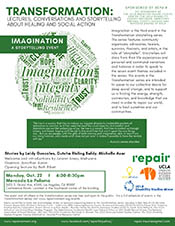 Monday, October 22, 2018
Monday, October 22, 2018
6:30-8:30 PM
Mercado La Paloma
3655 S. Grand Ave, #240
Los Angeles, CA 90007
Conference Room: Located in the Southeast corner of the building.
Imagination is the third event in the Transformation storytelling series. The series features community organizers, advocates, healers, survivors, theorists, and artists in the role of “storyteller.” Storytellers will draw from their life experiences and personal and communal narratives and histories in order to speak to the seven event themes included in the series. The events in the Transformation series are intended to speak to our collective desire for deep social change, and to support us in finding the energy, strength, connection, and knowledge that we need in order to repair our world, and to heal ourselves and our communities.
Stories by Leidy Gonzales, Cutcha Risling Baldy, Michelle Azar
Welcome and introductions by Juliann Anesi, Mishuana Goeman, and Jonathan Aaron
Opening lecture by Beth Ribet
Part of the Transformation: Lectures, Conversations, and Storytelling about Healing and Social Action event series. This event and all other Transformation series are free and open to the public. For a full schedule of events in the Transformation series, visit www.repairconnect.org/events.
Co-sponsored by the UCLA American Indian Studies Center, the UCLA Disability Studies Program, Improving Dreams, Equity, Access, and Success (IDEAS) at UCLA.
Anti-Racist Horizons: Zapatista Kuxlejal Politics and Indigenous Autonomy
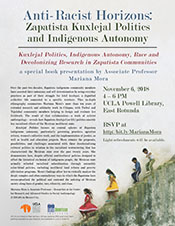 Tuesday, November 6, 2018
Tuesday, November 6, 2018
4–6 PM
UCLA Powell Library, East Rotunda
RSVP at http://bit.ly/MarianaMora Light Refreshments will be provided.
Associate Professor Mariana Mora will present on her book, Kuxlejal Politics: Indigenous Autonomy, Race, and Decolonizing Research in Zapatista Communities.
Over the past two decades, Zapatista indigenous community members have asserted their autonomy and self-determination by using everyday practices as part of their struggle for lekil kuxlejal, a dignified collective life connected to a specific territory. This in-depth ethnography summarizes Mariana Mora's more than ten years of extended research and solidarity work in Chiapas, with Tseltal and Tojolabal community members helping to design and evaluate her fieldwork. The result of that collaboration—a work of activist anthropology—reveals how Zapatista kuxlejal (or life) politics unsettle key racialized effects of the Mexican neoliberal state.
The Paradox of Indigeneity in the Philippine Context
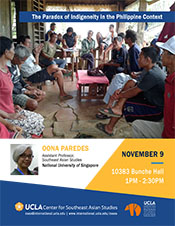 Friday, November 9, 2018
Friday, November 9, 2018
1-2:30 PM
10383 Bunche Hall
Dr. Oona Paredes will be discussing some of the challenges of securing and maintaining “Indigenous” status in the face of Filipino prejudices that simultaneously fetishize and marginalize indigenous minorities.
Oona Paredes is Assistant Professor in the Department of Southeast Asian Studies and Faculty Convenor for the Minor in Religious Studies at the National University of Singapore.
Co-sponsored by the UCLA Center for Southeast Asian Studies and UCLA American Indian Studies Center.
Living As Indigenous Inside the Dysmorphic Body
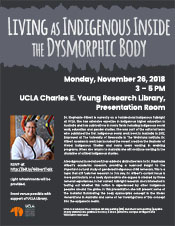 Monday, November 26, 2018
Monday, November 26, 2018
3–5 PM
UCLA Charles E. Young Research Library, Presentation Room
RSVP at http://bit.ly/GilbertTalk. Light refreshments will be provided.
Dr. Stephanie Gilbert is currently on a Postdoctoral Indigenous Fulbright at UCLA. She has extensive expertise in Indigenous higher education in Australia and has publications in many fields including Indigenous social work, education and gender studies. She was part of the editorial team who published the first Indigenous social work book in Australia in 2012. Employed at The University of Newcastle in The Wollotuka Institute, Dr. Gilbert’s academic work has included the recent creation the Bachelor of Global Indigenous Studies and many years working in enabling programs. When she returns to Australia she will continue working in the discipline of critical Indigenous studies.
A background in social work has added a distinctive lens to Dr. Stephanie Gilbert’s academic research, providing a nuanced insight to the important cultural study of gendered Indigenous child removals. This is a topic that still fuels her research to this day. Dr. Gilbert’s current focus is more particularly on a body dysmorphia she argues is created by these removal experiences. In her current Fulbright research, she’s interested in testing out whether this notion is experienced by other Indigenous peoples around the globe. In this presentation she will present some of the material illuminating the body dysmorphia concept in the Stolen Generations in Australia and some of her investigations of this concept into the epigenetic realm.
Stay Connected with AISC
|
® All Rights Reserved. © UCLA American Indian Studies Center
405 Hilgard Ave., 3220 Campbell Hall, Box 951548, Los Angeles, CA 90095-1548
310.825-7315 | www.aisc.ucla.edu | aisc@ucla.edu

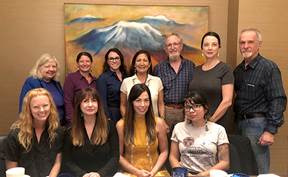
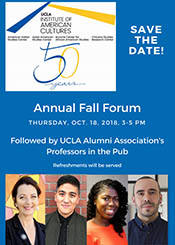 Thursday, October 18, 2018
Thursday, October 18, 2018